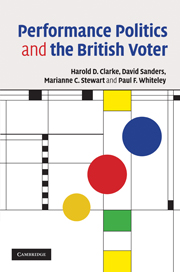Book contents
- Frontmatter
- Contents
- List of figures
- List of tables
- Acknowledgments
- 1 Performance politics and the British voter
- 2 The theory of valence politics
- 3 Valence politics and the long campaign
- 4 Tony's war
- 5 Electoral choices
- 6 The short campaign
- 7 Voting and political participation
- 8 Performance, people and the political system
- 9 Performance politics reconsidered
- Appendix A Vote in 2005 by socio-demographic characteristics
- Appendix B Turnout by socio-demographic characteristics
- Appendix C Dynamics of party identification
- Notes
- Bibliography
- Index
8 - Performance, people and the political system
Published online by Cambridge University Press: 06 January 2010
- Frontmatter
- Contents
- List of figures
- List of tables
- Acknowledgments
- 1 Performance politics and the British voter
- 2 The theory of valence politics
- 3 Valence politics and the long campaign
- 4 Tony's war
- 5 Electoral choices
- 6 The short campaign
- 7 Voting and political participation
- 8 Performance, people and the political system
- 9 Performance politics reconsidered
- Appendix A Vote in 2005 by socio-demographic characteristics
- Appendix B Turnout by socio-demographic characteristics
- Appendix C Dynamics of party identification
- Notes
- Bibliography
- Index
Summary
In previous chapters, we show that valence judgments have powerful effects on party choice and electoral participation. In this chapter, we consider how these judgments affect people's orientations towards themselves as political actors and their orientations towards various institutions of the British political system. A focus on people's sense of themselves as political actors enables us to explore the sources of several key independent variables that drive electoral turnout and other forms of political participation. Specifically, we develop and test models that explain why some people are more interested in politics, feel more politically efficacious, or have a stronger sense of civic duty than do others. In turn, a focus on orientations towards political institutions — on support for the ‘political regime’ (Easton, 1965) — enables us to study the extent to which effective government performance affects trust in major political institutions, attitudes towards parties and elections, and extent of satisfaction with the practice of democracy in Britain.
The first section develops a typology of citizens’ orientations towards the political system and describes operational measures of key concepts. The second section outlines the theoretical reasoning motivating our argument that valence considerations affect people's orientations towards politics in general just as they affect electoral choice in particular. Our core claim is that people are more likely to respond positively towards political institutions and processes when they think that those institutions and processes have delivered, or are likely to deliver, valued goods and services. They are more likely to respond negatively when institutions and processes have failed to deliver (or are seen as unlikely to deliver) them.
- Type
- Chapter
- Information
- Performance Politics and the British Voter , pp. 272 - 305Publisher: Cambridge University PressPrint publication year: 2009



